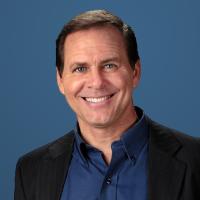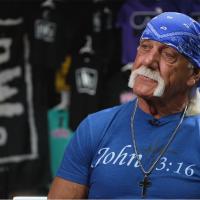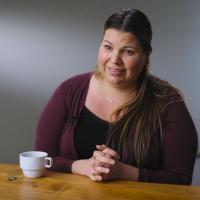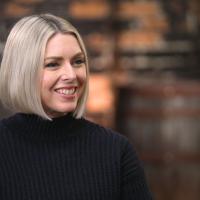Pro-Wrestler Finds Victory Outside of the Ring
He’s billed as America’s most requested school speaker! Marc Mero empathizes with both the vulnerability and potential of young lives. Marc explains, “I'm sharing my story and my brokenness, being lost, being hurt, being suicidal, depressed, all the things that I've experienced that I can relate to students on relevant issues. It's the comeback! You can't have a comeback without a setback!”
Drawing from his own personal success and setbacks, Marc’s journey was once seen as larger than life - from the stage of a professional wrestling ring, he recalls, “It was 1991, and I signed my first contract under the name – ‘Johnny B. Badd’. I was given my break by a man named, Dusty Rhodes, who became my mentor in professional wrestling. I thought when they first said to me, ‘you look like Little Richard!' I thought they were talking about a wrestling character! ‘No, no. I'm talking about the singer, (SINGS) a-whah-babbalubob-a-whah-babu.' I go, ‘Oh, I know that Little Richard!’ He goes, ‘You look just like him.’”
Marc’s fame grew quickly as one of the World Wrestling Champion favorites. Marc explains, “Johnny B. Badd was flamboyant, a free spirit. I think people could identify with him because they see he was having fun. As I learned professional wrestling and got better and better at it, I was Rookie of the Year my first year, and I eventually won ‘Most Improved Wrestler’ and wrestled some of the greatest wrestlers that ever lived.”
Marc’s emerging accomplishments rewarded his childhood hopes, saying, “I lived my life growing up in a single parent home. My mom worked two jobs. We lived on the west side of Buffalo, New York - poor, drug and gang infested neighborhood, and then all the things I wrote down as a little boy, I was able to achieve – I became a multi-millionaire. Get that big black Cadillac, buy my Mom a house, all the things I dreamed about that I thought were going to make me happy.”
But success came at a cost. Marc says, “Anyone that has tried professional wrestling realizes how physically demanding it is on your body. We would do up to 250 cities a year. I've had 14 surgeries; it really breaks down your body. More pain medication than we should. And there's a lot of addiction, recreational drugs. Steroid use. Alcohol. There wasn't much I didn't do. In the 14 years I was a professional wrestler, I think I was drug tested twice. You’re making a lot of money and you don't want to lose your spot, so if it means taking pain medication so you could wrestle that night, you do what it took.”
The excess also opened the door to distraction. Marc recalls, “As I started hanging out with people involved in drugs, alcohol, pills, and crazy lifestyle, the next thing you know, I'm living that lifestyle! You work your whole life to climb that ladder of success and I realized it was leaning against the wrong wall.”
Marc married and in 1996 was recruited by the World Wrestling Federation. Marc says, “I got a call from WWF to be flown to New York and have dinner with Vince McMahon. He wanted me in that company. And I told him the only way I'm coming is if I get a guaranteed contract. He goes, ‘agreed.’ And he gave me things I wanted, and I always felt like you never made it in professional wrestling unless you wrestled at WrestleMania. Knowing that I got there, I felt like achieved a goal that I've always wanted to do.”
But life grew intolerable when his marriage ended in 2004. “It's part of my story that spirals out of control,” Marc says, “when you find out your wife has met someone else. Heartbroken. Eventually we got divorced, and that's when it really took a turn for the worse, everything I touched was going south. And I remember feeling like rock bottom has a basement, and that's when I wanted to end my life.”
Marc wrestled with himself saying, “Johnny B. Badd was a character that I played, costumes and the makeup and all that. There was a man underneath that was broken, lost, alone. ‘Who am I? What is my purpose?’ I don't want to be here anymore. I retrieved my handgun, I walked into the shower, I put my back against the wall and (gestures) I put the gun up to my temple. Hell came into my mind. And it was so vivid. It was like this is not where I want to go. I remember just falling to my knees and pointing the gun away. And the first thing I did was just start begging God for forgiveness. I just started weeping, and the tallest I ever stood was that day I got down on my knees. I needed a friend. And there's no better friend than Jesus.”
Marc retired from the ring in 2006. His changed perspective became contagious. Marc says, “It wasn't nails that held Jesus on a cross, it was love. His love for you and me. And I wanted to give back. I wanted them to see that there is a God. There is someone who loves us unconditionally! I love helping people, you know, and I got a call from a school that asked me if I'd come and speak. It started snowballing. I realized God had a purpose for my life. Whoever would think I’d be doing 230 events a year! I can't use the name Jesus or God. But I pray His love and light shine through me on every moment.”
While Marc’s journey led to his restoration, he also found what’s in a name, saying, “God has a sense of humor -- Johnny B. Badd --- B-A-D-D. I realize now that it really stood for Born Again Definitely Delivered. Just because some of us have had some bad chapters, it doesn't mean it's the end of the story. The name that really resonates the most is rescuer. He rescued me. He showed me that there is a much better life - just accept His son and my whole life changed.”




